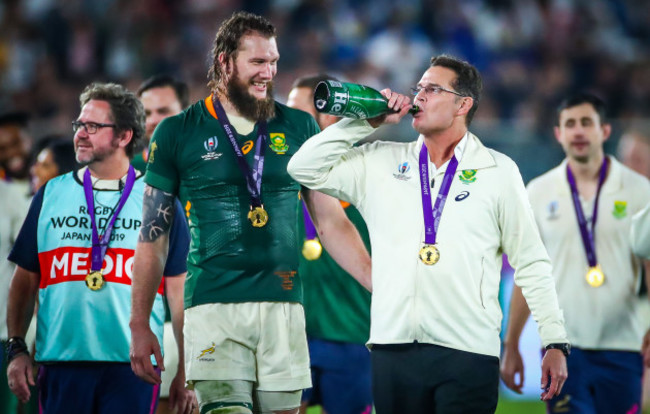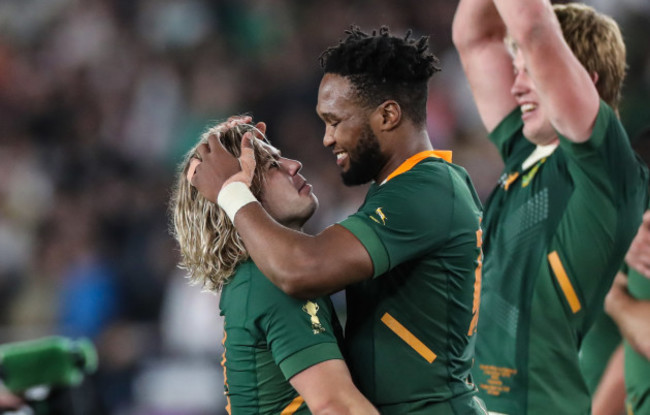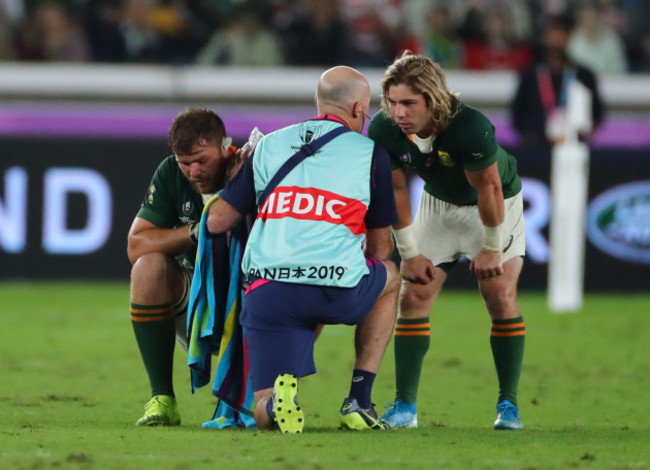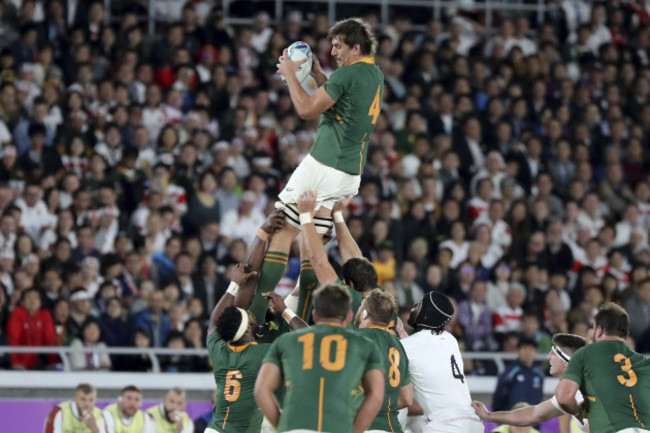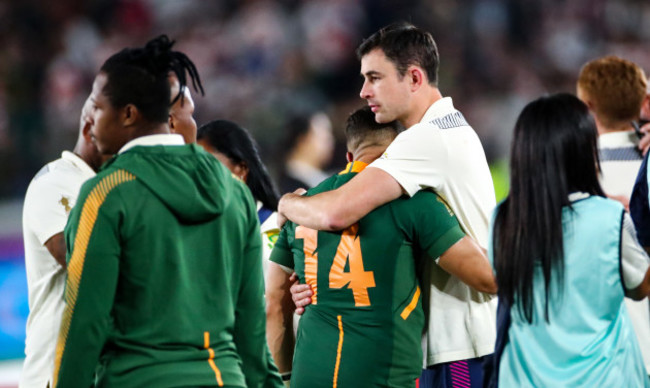IT WAS AROUND 18 months ago that Johan ‘Rassie’ Erasmus told the Springboks they could win the World Cup if they bought into his plan.
That was essentially at the very start of his reign, having returned from Munster with some important lessons from Irish rugby and with the Springboks in tatters.
Their 2016 and 2017 seasons under Allister Coetzee had been abysmal, leaving them ranked seventh in the world. The Boks lost eight of their 12 Tests in 2016, including their first-ever defeat to Italy, while 2017 included a 57-0 hammering at the hands of the All Blacks and a 38-3 thumping by Ireland soon before Erasmus arrived home.
But the former Springbok flanker, a tough and clever player in his own time, got the Boks to believe again.
It might have taken some of them more time than others but improved results on the pitch helped, from beating England 2-1 in their 2018 June Test series to recording a stunning victory over the All Blacks in Wellington in the new boss’ first season in charge.
Winning the condensed Rugby Championship this year simply underlined to Erasmus’ players that they had firmly turned the corner and that winning this World Cup was a realistic goal, even if others doubted their chances.
“That’s the thing, Rassie is all about belief,” said 34-year-old prop Tendai ‘The Beast’ Mtawarira after last night’s stunning 32-12 final victory over England, in which he led a scrum demolition job.
“Rassie just believed and worked at every facet of the game that we needed to improve upon. Today, it all came to fruition.”
The final was a fine showpiece of the job Erasmus has done. Importantly, he returned home in his dream position of director of rugby of the South African Rugby Union on a six-year deal, as well as being Boks head coach, underlining the power he had been handed.
Instantly, Erasmus abolished the previous rule prohibiting the Boks from selecting overseas-based players. And instantly, he could pick experienced talent like Faf de Klerk, Willie le Roux, Duane Vermeulen [based in Toulon at the time], and Frans Steyn.
This World Cup squad included Cheslin Kolbe, Vincent Koch, Franco Mostert, de Klerk, Francois Louw, le Roux, and Cobus Reinach – all of whom are playing club rugby abroad. It remains to be seen how South African rugby deals with the continuing exodus of its players but for this World Cup, Erasmus’ rule change was key.
Erasmus then made the bold move of selecting flanker Siya Kolisi as the first-ever black captain of South Africa, another intelligent and important decision.
The Boks coach might have let on this week that he hadn’t realised the symbolic power of Kolisi – who grew up in the impoverished township of Zwide in Port Elizabeth – being South Africa’s leader but that is very difficult to believe.
Kolisi is a superb rugby player who leads by subtle example on the pitch but he has been an absolute totem as the figurehead of this group and the South African nation has been quicker to get behind this team because of his humble nature and remarkable story.
With Kolisi at the helm, Erasmus encouraged his players to tap into just how meaningful World Cup success would be to their country, which in turn managed to ease the pressure on them. Erasmus helped to put the pressures of a World Cup in perspective.
“Our country is not in a good state at the moment,” said replacement fullback Steyn last night. “There are droughts in some places that have been going on for three or four years. This gives hope for so many people.
“I don’t think the guys realised what they just did, but when they get home they will.”
“It’s special for all of us,” added Kolisi himself. “I have never seen such support in South Africa from people back home. I honestly don’t know if we could have done it without them and everywhere we saw the videos of people coming together.
“It was really beautiful for us to see. It was awesome and I am really grateful that I can share this moment with people.”
Tactically, Erasmus has taken the Boks back to the future. They have played to traditional South African strengths, of course, but that shouldn’t mean we dismiss how good they have been at what they have done in this World Cup.
Bringing Jacques Nienaber home with Erasmus from Munster was key, with the defence coach’s reputation only enhanced in this World Cup thanks to the sublime South African defence which only conceded four tries in Japan. Their average of 0.6 tries conceded per game was the best in the competition.
Their ultra-aggressive linespeed suffocated teams and forced them into panicky errors, while grandstand sets like the 26-phase passage that prevented England from scoring a first-half try last night flooded the team with belief.
South African snipers like de Klerk constantly rushed up to shut down attacking options for the opposition and Steyn explains that Nienaber pushed his players to back their decision-making.
“Jacques wants us to take chances,” said Steyn. “The more chances you take, the better you get at reads and the less mistakes you make.”
Nienaber would have taken real satisfaction from Cheslin Kolbe’s try last night, starting as it did with a turnover hit from Malcolm Marx on Henry Slade.
Erasmus worked with existing forwards coach Matt Proudfoot to get the Boks’ set-piece play back to peak levels, with the results extremely impressive at this World Cup.
The Boks’ scrum dismantled England for five key penalties, meaning they won a total of 14 penalties at scrum time in this World Cup, with Georgia [11] the only other team to make it past 10.
Incredibly, the Boks lost just one of their 69 lineouts in the World Cup, a stunning return of nearly 99% on their own throw. They also stole 15 opposition lineouts, more than any other team in the competition.
In a sport where set-piece in absolutely pivotal, the Boks were simply sublime.
The South Africans had their critics for a lack of attacking ambition in their quarter-final and semi-final wins over Japan and Wales, but their two clinical tries through wings Makazole Mapimpi and Kolbe last night showed they possess class in that area too.
Often, they were focused on applying kick pressure – only Argentina kicked more on average than the Boks in this World Cup – but Erasmus’ men did thrill at times in this World Cup final.
The Mapimpi try was outstanding as the brilliant Lukhanyo Am and impactful hooker Marx showed excellent handling skills to give their left wing time to chip ahead accurately, Am regathering and firing a nonchalant pass to Mapimpi to finish.
It’s worth remembering too that the Boks played to width early in the game, adding to the muddiness in England’s thinking as they saw a different picture to the one they expected.
Having steamrolled Namibia, Italy, and Canada in the pool stages, the Boks actually ended this World Cup behind only New Zealand in terms of average tries per game at 4.7, and they will feel they can get better in attack in the seasons to come.
Physically, the Boks were outstanding in this tournament, with Erasmus having plucked strength and conditioning expert Aled Walters from Munster soon after his return home to oversee this area. The affable Welshman has proven popular and professional.
So too has 32-year-old Irishman Felix Jones, who Erasmus attempted to lure across on several occasions before finally getting his man just before the World Cup.
Jones came on board to offer analysis on opposition defences and individuals but, by all accounts, he has added even more than that, pushing the Boks to bring more intensity to their training sessions and working with individual players on their technical skills. The former Ireland fullback now has a World Cup winner’s medal.
Assistant coach Mzwandile Stick has been an important presence too, working closely with individuals like Makazole Mapimpi to bring about rapid improvements.
Overseeing everything has been Erasmus, a calm and confident leader who has a ruthless edge when it’s required.
He laid down the law to his Boks players from the very beginning.
“The first meeting we had was in Johannesburg and it was straightforward – he told us exactly what we were doing as players,” recalls Kolisi. “A lot of us were getting quite a lot of money and doing all the things off the field full steam, trying to inspire people, but we didn’t make rugby the main thing.
“He told us that it had to change, the shift had to come. Rugby is more important and the Springboks are more important than our personal goals. Because there are so many people who spend their last salary to come and watch us play, and they want to see us give our best and that was the change of mindset.
“I think the most important thing that he brought in was honesty. He was always honest with all of us and he told no one else, just us as a team. It was really amazing because you always knew where you stood.”
The scary thing for everyone else is that the Boks truly believe they are only getting started.
Erasmus will leave his head coach role after this World Cup, focusing on being director of rugby, but with plenty of chat that Nienaber is being lined up to step up as head coach, there may not be too much upheaval.
There are big challenges ahead in South African rugby, but Erasmus is eyeing even more success.
“Coach Rassie made a promise to us that whatever happens, we will take this momentum forward and make sure that we’re ready for the next World Cup and we will keep the Springbok name up high,” said scrum-half de Klerk last night.
“He’s made that promise and he’s never been a guy to shy away from that, so we’ve got belief that they have put the right structures in place for us going forward.
“It’s very positive and there is just sometimes so much talent that gets lost in South Africa in certain ways but we’ll make sure the Springbok name stays proud.”

